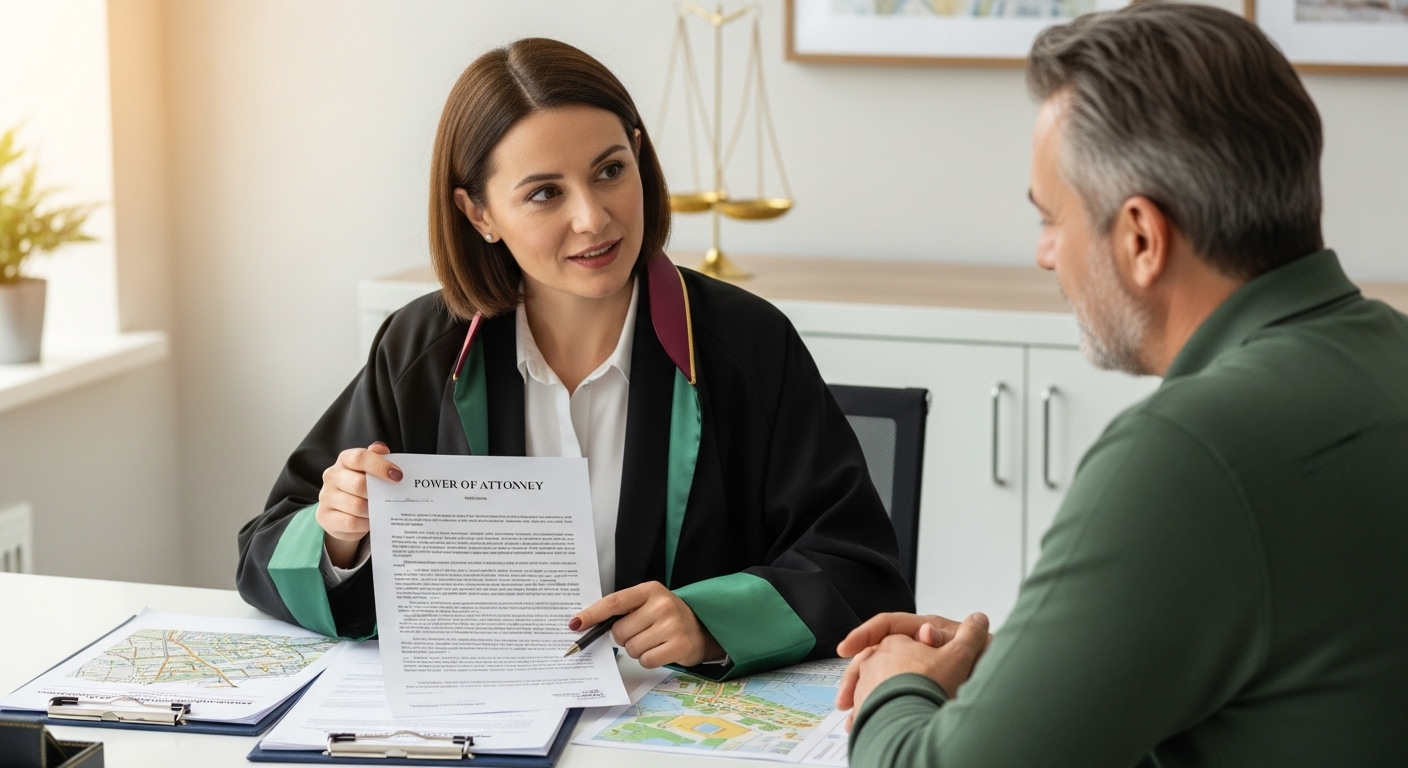Power of Attorney Explained for Turkish Real Estate
Learn how a Power of Attorney works for buying, selling, and managing real estate in Turkey. A complete 2025 guide for foreign investors.

1. Introduction: Understanding Power of Attorney in Turkey
Buying or selling real estate in Turkey is an exciting venture, but if you’re a foreigner or a busy local, it might come with some hurdles—especially if you can’t be there in person. That’s where a Power of Attorney (PoA) becomes your best friend. In simple terms, a PoA allows someone you trust to act legally on your behalf. This means they can handle all the paperwork, sign contracts, pay taxes, and even collect keys for you.
Why does this matter so much in Turkey? The Turkish property market has grown dramatically in the last decade, attracting thousands of foreign investors every year. Many buyers can’t travel back and forth multiple times just to handle signatures or stand in line at the Tapu Office (Title Deed Office). A properly prepared PoA solves this problem and saves time, money, and stress.
This article is your complete, no-nonsense guide to understanding how Power of Attorney works specifically for real estate in Turkey—whether you’re purchasing a seaside villa in Bodrum or an apartment in Istanbul. By the end, you’ll know exactly how to issue, use, and cancel a PoA safely and wisely.
2. What is a Power of Attorney?
2.1 Definition and Legal Meaning
A Power of Attorney is a legal document that gives another person the authority to act on your behalf in certain legal or financial matters. In Turkey, this is called a "Vekaletname" and is recognized under the Turkish Civil Code.
The main idea is simple: you, the principal, authorize someone else—the attorney-in-fact or agent—to do things you’d normally have to do yourself. This can be as broad as managing your entire property portfolio or as limited as signing one specific contract.
The beauty of the Turkish legal system is that it clearly defines the agent’s powers in the PoA document. So, you can specify exactly what your agent can and cannot do. For example, you can authorize your agent to sign the sales contract, register the title deed, pay taxes, or even apply for utilities in your name.
2.2 Types of Power of Attorney in Turkey
In Turkey, PoAs can generally be divided into two main types:
General Power of Attorney: This grants broad powers over many affairs. It’s rarely used in real estate deals because it gives too much authority, which can be risky.
Specific (Limited) Power of Attorney: This is what most property buyers and sellers use. It strictly limits what the agent can do—such as buying or selling a particular property or handling title registration.
Most notaries in Turkey advise foreigners to issue specific PoAs to prevent misuse. Also, you can set time limits so the PoA automatically expires after a certain date.
3. Why Do You Need a Power of Attorney for Turkish Real Estate?
3.1 Convenience for Foreign Buyers
Turkey’s property market is attractive but comes with formalities—lots of them. Every step must comply with Turkish law, and transactions usually require your physical presence at the notary, land registry, tax office, and bank. For foreign buyers who live abroad, flying back and forth for signatures is costly and impractical.
A PoA removes this headache entirely. By authorizing a trustworthy agent (often your lawyer or a professional property consultant), you ensure the purchase or sale progresses smoothly without you needing to be in Turkey at every stage. It’s like sending a reliable clone of yourself to handle the red tape!
3.2 Legal Requirements and Obligations
In many cases, Turkish banks, land registries, and notaries won’t process certain transactions without your signature or a valid PoA. So, if you want to close a deal while you’re abroad, you must have an authorized agent with a notarized PoA.
Remember: a PoA is legally binding in Turkey. So, you must draft it carefully to avoid giving unnecessary powers. Turkish notaries usually have standard PoA templates for real estate transactions to prevent misunderstandings.
4. How to Get a Power of Attorney in Turkey
4.1 Process for Issuing a Power of Attorney Locally
Issuing a PoA in Turkey is straightforward if you’re physically in the country. You just visit a notary office with your passport and your agent. You explain what powers you want to grant, the notary drafts the document (in Turkish), reads it out loud to both parties, and then you sign it.
Usually, an official translator is present if you don’t speak Turkish. After signing, the notary stamps and registers the document immediately. Your agent gets an original copy and can use it at government offices, banks, and the land registry.
4.2 Getting a Power of Attorney from Abroad
Not in Turkey? No worries—many foreigners issue PoAs from their home countries. The process is a bit longer but just as valid.
Here’s how:
Visit a local notary public in your country.
Have the PoA drafted in Turkish (with a translated version if required).
Sign the document before the notary.
Legalize it with an Apostille if your country is part of the Hague Convention.
Send the notarized, apostilled document to Turkey by courier.
Your lawyer or agent will then get it translated and registered at a Turkish notary.
5. Key Parties Involved in a Power of Attorney for Property
5.1 The Principal
The principal is you—the person granting the power. You decide what powers to give and for how long. It’s your responsibility to choose a trustworthy agent and ensure the document accurately reflects your intentions.
Your signature and passport copy are needed for the PoA to be valid. In some cases, you may also need to provide tax ID details if your agent will handle financial transactions.
5.2 The Attorney-in-Fact (Agent)
This is the person or entity you authorize to act on your behalf. In Turkey, it’s common to appoint:
A lawyer specializing in property law.
A professional, licensed real estate consultant.
A trusted local friend or family member.
Always ensure your agent is reliable and preferably has professional indemnity insurance. This minimizes the chance of mistakes or fraud.
6. Documents Required to Issue a Power of Attorney in Turkey
Issuing a Power of Attorney in Turkey is a legally sensitive process, so you must have the correct documents ready. Missing paperwork can delay your property transaction or, worse, render the PoA invalid. So, what exactly do you need? Let’s break it down clearly.
Essential Documents for the Principal:
Valid Passport: A notarized copy of your passport is mandatory. This proves your identity and nationality. Turkish notaries will keep a copy for their records.
Tax Identification Number (Vergi Numarası): If you’re buying or selling property in Turkey, you’ll need a Turkish tax number. It’s free and easy to get from a local tax office. Your agent can help you obtain it.
Photos: Some notaries ask for biometric passport photos of the principal. These are attached to the PoA document for identification.
Proof of Address: Occasionally, a utility bill or bank statement showing your home address may be requested, especially if you issue the PoA abroad.
Documents for the Attorney-in-Fact (Agent):
ID or Passport Copy: Your agent must also present valid identification. If your agent is a company (e.g., a law firm), they provide proof of company registration and an authorized signatory.
Contact Information: Full address and phone number of the agent are included in the PoA.
Special Requirements for Foreign Issuance:
When issuing the PoA outside Turkey, you must:
Use a Local Notary: Have the document drafted in Turkish or bilingual format (Turkish and your native language).
Legalize the Document: Use an Apostille if your country is a member of the Hague Apostille Convention. If not, you’ll need legalization by the Turkish Embassy or Consulate.
Translation in Turkey: Once the PoA arrives in Turkey, an official sworn translator must translate it into Turkish before submitting it to a local notary for final certification.
A small mistake, like a missing stamp or an incomplete Apostille, can render your PoA useless—leading to frustrating delays. Always double-check with your lawyer or real estate agent before sending documents.
7. Notarization and Translation: Why They Matter
In Turkey, notarization and accurate translation are not just formalities—they are mandatory legal safeguards. Let’s dive deeper into why they matter so much for your Power of Attorney.
Why Notarization is Required:
A notarized PoA ensures that both the principal and the agent fully understand and agree to the powers being granted. Turkish law demands this to protect both parties and prevent fraud. The notary verifies:
The identities of the principal and the agent.
The scope of authority granted.
That the principal is mentally competent and acting voluntarily.
Without notarization, no government office, bank, or land registry will accept your PoA for property transactions.
Importance of Official Translation:
Turkey is strict about language in legal documents. If your PoA is issued abroad or if you don’t speak Turkish, an official, sworn translator must translate the document into Turkish before the notary finalizes it.
This step ensures you understand exactly what you’re authorizing. It also guarantees that Turkish officials can process the document without confusion or errors. Incorrect translations can cause legal disputes or rejected applications.
Practical Tip:
Always use a licensed translator recommended by your lawyer or notary. Avoid cheap, unofficial translations; they often lead to costly delays.
8. Common Uses of Power of Attorney in Real Estate Transactions
A Power of Attorney is a game-changer in Turkish real estate because it transforms complicated, time-consuming tasks into smooth, legally secure transactions—especially for foreign buyers and sellers who can’t always be in Turkey. Let’s break down exactly how it works in practice.
8.1 Buying Property
When buying real estate, a PoA allows your trusted agent or lawyer to handle every official step without needing you to be physically present for each signature or visit. With a PoA, your agent can:
Sign the purchase agreement with the seller.
Apply for and receive the Title Deed (Tapu) from the land registry.
Open a bank account in your name if needed for money transfers.
Pay all required taxes, fees, and notary expenses.
Apply for and set up utility connections like electricity, water, and internet.
For many foreign investors, this is an absolute lifesaver—it saves multiple trips and prevents deals from stalling due to paperwork delays. For a full roadmap on what to expect when purchasing your dream property, check out The Complete 2025 Guide to Buying Property in Turkey. It explains every legal step and hidden detail so you don’t miss a thing.
8.2 Selling Property
Selling property in Turkey is equally detail-heavy and requires multiple official interactions. A properly drafted PoA lets your agent or lawyer handle the process seamlessly while you remain abroad. With a PoA, your representative can:
Advertise and list your property with real estate agencies.
Handle negotiations with potential buyers.
Sign the official sales contract and any required legal forms.
Complete the title deed transfer at the Tapu office.
Hand over the keys to the new owner.
Collect the sale proceeds and transfer them securely to your bank account.
Always be crystal clear in the PoA about whether your agent has permission to accept and transfer funds on your behalf; vague wording could lead to banks rejecting a transaction for security reasons.
If you’re planning to sell, make sure you’re familiar with all the updated laws and market trends—How to Sell Property in Turkey: The Complete Guide for 2025 breaks it down step-by-step and helps you avoid costly mistakes.
8.3 Managing Property
Even after you purchase your property, a Power of Attorney can make your life incredibly easy when it comes to long-term property management—especially if you don’t live in Turkey year-round. Many foreign owners use a PoA to delegate routine responsibilities to a trusted property manager or lawyer. With a valid PoA, your agent can:
Renew rental contracts and handle all paperwork with tenants.
Oversee necessary repairs, renovations, or maintenance.
Pay annual property taxes and utility bills on time.
Represent you in meetings with homeowners’ associations or local authorities if disputes or issues arise.
This is a huge benefit if you own a vacation home on the coast or an investment apartment in Istanbul but spend most of your time overseas. With a responsible local representative, you can rest assured your property stays in excellent condition, your tenants are looked after, and all legal obligations are met without stress.
If you’re interested in maximizing your rental income or learning more about hassle-free professional property care, read this detailed guide on Property Management Services & Tenant Placement to understand what to expect and how to choose the right service for your needs.
9. Risks of Giving Power of Attorney in Turkey
Like any legal tool, a PoA is powerful but can be risky if misused. Let’s be honest—trusting someone else with authority over your property is a big deal. Here’s what you need to watch out for and how to protect yourself.
9.1 Potential for Abuse
If you grant broad powers without restrictions, a dishonest agent could:
Sell your property without your knowledge.
Collect sale proceeds and disappear.
Take loans or mortgages using your property as collateral.
Make poor decisions that cost you financially.
Scary, right? Unfortunately, abuse cases do happen, especially when foreigners trust unlicensed agents or casual acquaintances.
9.2 How to Minimize Risks
Here’s how smart investors avoid trouble:
✅ Use a Limited PoA: Clearly state what the agent can and cannot do. For example, limit them to signing only one property sale deed.
✅ Set an Expiry Date: Many notaries recommend a PoA valid for a few months only, enough to complete the transaction.
✅ Choose a Professional Agent: Hire a reputable lawyer or licensed real estate professional instead of a random friend.
✅ Notify Your Bank and Registry: Let your bank and local land registry office know who your agent is and what they’re allowed to do.
✅ Revoke When Done: Once the transaction is complete, cancel the PoA officially to prevent future misuse.
Being cautious doesn’t mean being paranoid—it means being smart!
10. How to Revoke a Power of Attorney in Turkey
Canceling a PoA is just as important as issuing one. If you don’t revoke it after your business is done, your agent still has legal authority to act in your name. Here’s how to end it properly:
How to Revoke:
Visit any Turkish notary office and declare that you want to cancel your PoA.
The notary will prepare a revocation document (Azilname).
Sign it, and the notary will officially register the revocation.
If you issued the PoA abroad, you can revoke it abroad too, using your local notary and Apostille, then send the revocation to your agent and relevant Turkish offices.
Inform Everyone:
Always inform your agent, your bank, the land registry, and anyone else who might rely on the old PoA. This ensures nobody acts on your behalf without your permission.
11. Legal Validity and Duration of Power of Attorney
Understanding how long your Power of Attorney (PoA) remains valid is crucial to avoid unwanted surprises. In Turkey, there’s no universal expiration date for a PoA—it stays in effect until you revoke it, unless you specify a time limit in the document itself.
How Long Does a PoA Last?
By default, Turkish law does not automatically cancel a PoA after a sale or purchase. So, if you give your agent the authority to sell your apartment, and they complete the sale but you forget to cancel the PoA, they technically still have power to act for you on any other tasks mentioned in that document. This is why many foreign property owners run into trouble: they simply forget to revoke it.
Best Practice:
Define a Clear Expiry Date: For real estate deals, a common practice is to set the PoA to expire after 6 months or once the deal is complete.
Limit the Scope: Use very precise wording. For example, “This PoA is valid only for the purchase of Apartment No. X at Address Y.”
Revocation Clause: Some PoAs include an automatic clause stating it becomes void once the transaction finishes.
Legal Validity in Court:
A properly notarized and, if needed, apostilled PoA holds up in Turkish courts. However, if there’s a dispute about misuse or fraud, the court will examine whether the principal fully understood the powers given. So, always double-check the translation and the authority you grant.
12. Tips for Choosing a Trustworthy Agent
Picking the right person or company to act on your behalf is the single most important decision when issuing a PoA for property in Turkey. So, how do you choose wisely?
Who Makes a Good Agent?
Licensed Real Estate Lawyer: This is the safest choice. Lawyers are bound by strict professional ethics and can be held legally responsible for negligence or fraud.
Certified Real Estate Consultant: Many agencies have licensed consultants experienced in helping foreign buyers. They often work closely with lawyers.
Close Family Member: If you have trusted family living in Turkey, this can work too—but make sure they understand the legal responsibilities.
Red Flags to Avoid:
An unregistered “property fixer” who offers to handle everything for a suspiciously low fee.
An agent who pressures you to give broad powers with no expiry date.
Someone who refuses to provide a written contract or proof of license.
Smart Precautions:
✅ Meet your agent face-to-face if possible, or verify their credentials through the local bar association or real estate chamber.
✅ Ask for references from other foreign clients.
✅ Draft the PoA with your own lawyer, not the agent’s lawyer.
✅ Avoid granting power over your bank accounts unless absolutely necessary.
Choosing an agent is like giving someone the keys to your house—do it wisely!
13. Costs Associated with Power of Attorney in Turkey
While a PoA can save you money on flights and time off work, it does come with some costs. Here’s a realistic breakdown so you know what to expect.
Notary Fees in Turkey:
The cost depends on the length and complexity of the PoA.
For a standard property purchase or sale, expect to pay between €50 and €150 at a local notary.
If you need an official sworn translator, add about €20–€50 more.
Apostille and Translation Costs (Abroad):
Issuing a PoA abroad involves paying your local notary’s fee—this varies by country.
The Apostille (or consular legalization) might cost extra—typically €20–€100 depending on your country.
Once the document arrives in Turkey, official translation costs about €20–€50 per page.
Legal Fees (Optional but Recommended):
Many buyers hire a lawyer to draft or review the PoA. A good real estate lawyer might charge €200–€500 depending on their services.
This is money well spent—your lawyer will ensure the PoA protects you, not just your agent.
Other Possible Costs:
Courier fees if you mail documents internationally.
Small admin fees for registering the PoA with the land registry.
Pro Tip:
Always ask for an itemized cost breakdown in advance. Avoid agents who hide fees or insist on cash-only payments.
14. Frequently Asked Questions about Power of Attorney in Turkish Real Estate
Q1: Can I buy or sell Turkish property without visiting Turkey at all?
Yes! With a properly drafted PoA, your lawyer or trusted agent can handle the entire transaction for you—signing contracts, paying taxes, and registering the title deed.
Q2: Is it safe to give PoA to a real estate agent instead of a lawyer?
It can be safe if the agent is licensed, reputable, and you limit the PoA’s powers. But lawyers are generally a safer bet because they’re legally accountable.
Q3: Do I need a PoA if I already signed a sales contract?
Often, yes. The contract is just the agreement. To finalize the title deed transfer, pay taxes, and get utilities, your signature—or your agent’s signature via PoA—is still needed.
Q4: Can I cancel my PoA anytime?
Absolutely. You can revoke it at any Turkish notary or, if abroad, via your local notary plus Apostille. Always notify your agent and the land registry.
Q5: Does the PoA need to be in Turkish?
Yes, for use in Turkey, the final notarized version must be in Turkish. If issued abroad, it must be officially translated and notarized in Turkey.
Conclusion: Use Power of Attorney Wisely
A well-prepared Power of Attorney can turn a complicated Turkish property deal into a hassle-free experience. Just remember: limit its scope, choose a trusted agent, and cancel it once done.
For extra guidance, don’t miss these step-by-step resources:
👉 The Complete 2025 Guide to Buying Property in Turkey
👉 How to Sell Property in Turkey: The Complete Guide for 2025
Safe investing, and may your Turkish real estate adventure be smooth and profitable!
Have Question Or Suggestion ?
Please Share Your Thought, To Make It Real


